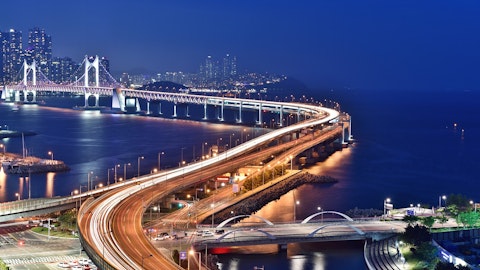In this article, we will look at the 20 most overworked countries in Asia. We have also discussed the dire consequences of overworking. If you want to skip our detailed analysis, head straight to the 5 Most Overworked Countries in Asia.
Growing Concerns about Mental Health in Asia
They say that the opposite of success is not failure, it is overwork and rightly so. In the Asia-Pacific region, mental health challenges are pronounced, with statistics highlighting the severity of the issue. In South Korea, the mean annual per-person costs for absenteeism are notably low, contrasting with Japan’s highest figures. South Korea’s low absenteeism costs suggest workers may hesitate to take time off, likely due to pressure to prioritize work. Conversely, Japan’s high costs indicate a culture where employees may be more willing to take sick leave. However, both countries still struggle with overwork culture’s negative impacts.
Recent surveys have indicated alarming trends, such as 1 in 4 employees in Hong Kong experiencing mental health issues and a large portion of employed individuals in Singapore avoiding seeking help due to stigma.
The stigma surrounding mental health persists due to limited awareness and traditional beliefs deeply ingrained in Asian cultures. Lack of education on mental health in places like China and Hong Kong contributes to misconceptions and reluctance to seek help. Moreover, traditional views linking mental illness to personal failure or family shortcomings exacerbate the stigma. Beyond Asia, Mexico is one of the most overworked countries in the world.
Overwork Culture in Asia
Additionally, many Asian countries struggle with cultures of overwork, such as Japan’s notorious “karoshi” phenomenon and South Korea’s “gapjil” culture of entitlement. Long hours and high-pressure work environments take a toll on employees’ mental and physical well-being, ultimately impacting productivity. Breaking the cycle of overwork requires intentional efforts by employers to shift perceptions and prioritize employee well-being over excessive work hours.
In addition, in Asia, overwork culture is rampant, with workers averaging 45-hour workweeks and only two weeks of annual leave, compared to 33-hour workweeks and a month of leave in Australia. This trend persists across Japan, Korea, and China and other Asian countries. Rooted in a belief that longer hours signal diligence, employees fear rejecting extra work or leaving before superiors. Work-from-home arrangements exacerbate the issue, leading to burnout and adverse health effects. Karoshi, or death by overwork, is a recognized danger, with symptoms including insomnia, depression, and anxiety.
For example, the exodus of nurses from Nepal is not solely driven by the promise of higher wages abroad but also by the burdensome workload and demanding working conditions they face at home. Within Nepal’s healthcare system, nurses often find themselves overworked and stretched thin, with insufficient staffing to meet the demands of patient care. For instance, Grishma Basnet, a nurse in Kathmandu, highlights the issue of being tasked with caring for three patients in the intensive care unit (ICU), a workload that far exceeds global standards which recommend one nurse per patient. This level of overwork leads to burnout, frustration, and a sense of exploitation among healthcare professionals. To read more about nursing shortages, see countries that need nurses the most.
It is interesting to note that Netherlands is one of the least overworked countries in the world. To read more about working hours, see Countries with the Shortest Working Hours in the World.
Are Asian Companies Promoting Overwork Culture?
To highlight the severity of the overworking culture in Asia, the tragic deaths of two young employees at Pinduoduo Holdings Inc (NASDAQ:PDD) have confirmed concerns over the company’s treatment of its workforce amid its rapid growth. One employee, a programmer, took his own life, while another died suddenly after work. These incidents have intensified criticism of the grueling work culture prevalent in China’s tech sector, with Pinduoduo Holdings Inc (NASDAQ:PDD) being accused of exploiting its employees for the sake of expansion. Reports indicate that employees are subjected to long hours, with some working up to 380 hours per month, far exceeding legal limits.
Pinduoduo Holdings Inc (NASDAQ:PDD)’s aggressive expansion into new ventures like Duoduo Wallet and Duo Duo Maicai has further fueled concerns. Despite its workforce facing immense pressure and stringent evaluation criteria, the company continues to prioritize growth over employee well-being. The so-called “996” work culture, where employees work from 9 a.m. to 9 p.m., six days a week, is prevalent, leading to mental and physical strain on workers. However, despite the outcry and investigations into its practices, Pinduoduo Holdings Inc (NASDAQ:PDD) remains focused on growth, with its stock price growing and new ventures driving revenue.
The deteriorating work environment at Pinduoduo Holdings Inc (NASDAQ:PDD) reflects broader challenges within China’s tech sector. As economic growth slows and competition intensifies, companies resort to militarized management styles to maintain productivity.
On the other hand, JD.com Inc (NASDAQ:JD)’s investment in employee well-being is evident through its innovative initiatives and substantial financial commitments. The launch of “JD Youth City” near its Beijing headquarters demonstrates a significant investment of RMB 6 billion ($840 million), providing nearly 4,000 furnished apartments and various amenities, aimed at reducing rental costs and commute times for employees, thus easing the pressures faced by those starting their careers.
Furthermore, JD.com Inc (NASDAQ:JD)’s focus on gender equality is exemplified by its recognition from the United Nations Global Compact. By fostering a supportive workplace culture and implementing initiatives like the “Sunshine Angels” program, JD.com Inc (NASDAQ:JD) empowers its employees, including women and individuals with disabilities, to thrive both personally and professionally. The company’s dedication to gender equality extends beyond internal programs, as evidenced by its participation in global initiatives like the UN Global Compact’s Target Gender Equality Accelerator program, highlighting a comprehensive approach towards promoting diversity and inclusion.
Additionally, JD.com Inc (NASDAQ:JD)’s community engagement extends to rural areas through initiatives like “Sending New Year’s Gifts to Villagers,” which has reached over 8,000 towns and villages across China, showcasing the company’s commitment to social responsibility. Through these initiatives, JD.com Inc (NASDAQ:JD) not only enhances employee well-being but also contributes to broader societal welfare, aligning its corporate strategies with sustainable development goals.

Photo by Anthony Tran on Unsplash
Our Methodology
To list the most overworked countries in Asia, we looked at the data on the average hours per employed person per week. The idea was that this metric provides a quick snapshot of workload distribution within a population, aiding in identifying trends and disparities. By comparing against standard benchmarks such as the such as full-time employment regulations, it offers a baseline for evaluating work intensity. We relied on the latest data by International Labor Organization, last updated in January 2024. The list is presented in an ascending order.
By the way, Insider Monkey is an investing website that uses a consensus approach to identify the best stock picks of more than 900 hedge funds investing in US stocks. The website tracks the movement of corporate insiders and hedge funds. Our top 10 consensus stock picks of hedge funds outperformed the S&P 500 stock index by more than 140 percentage points over the last 10 years (see the details here). So, if you are looking for the best stock picks to buy, you can benefit from the wisdom of hedge funds and corporate insiders.
20. Thailand
Average Hours Per Employed Person: 42.3
Bangkok, Thailand, has been struggling with an overwork culture as it ranks 96th out of 100 countries for work-life balance list by software firm Kisi and with 7th place in the overworked population index. Factors such as remote working, limited vacations, affordability, and city safety contribute to this stressful environment. Despite global trends towards better work-life integration, Bangkok shows no improvement, reflecting economic challenges like Covid-19 fallout and high inflation.
19. Sri Lanka
Average Hours Per Employed Person: 42.4
The overworking culture in Sri Lanka can be attributed to several factors such as societal norms valuing hard work, economic pressures, and a competitive job market. Traditional values often prioritize dedication to work, leading to long hours and reluctance to take breaks.
18. Singapore
Average Hours Per Employed Person: 42.6
Singaporeans are notably overworked, topping the Asia-Pacific. Moreover, 48% report workplace dissatisfaction, with 70% experiencing work-related stress, and only 12% feeling genuinely engaged. Singapore is also often named as the one of the most overworked cities in the world.
On a side note, Singapore is also one of the most respected countries in Asia.
17. Hong Kong
Average Hours Per Employed Person: 43.0
In Hong Kong, the culture of overwork persists, with statistics painting a concerning picture. Surveys reveal that more than half of Hongkongers work over 45 hours a week, and 7.3% toil for more than 70 hours, significantly surpassing the International Labour Organization’s recommendations. These long hours not only exceed healthy limits but also lead to detrimental effects on workers’ well-being and productivity.
Moreover, the consequences of overwork extend beyond exhaustion. Symptoms such as long-term tiredness, decreased concentration, and stress are reported by 85% of respondents. Alarmingly, sudden death due to overwork is also a reality. These realities also explain why Hong Kong is often considered one of the most overworked cities in the world.
16. Turkey
Average Hours Per Employed Person: 43.9
According to a report by the Turkish Statistical Institute, Turkey struggles with a pervasive overwork culture. Approximately 28% of Turkish employees work more than 48 hours per week, exceeding the European Union’s standard of 40 hours. This prevalent culture of overwork not only impacts individuals’ physical and mental well-being but also poses challenges to work-life balance and productivity.
15. Iran
Average Hours Per Employed Person: 44.3
As one of the countries where overworking is common, economic pressures, exacerbated by international sanctions and a struggling economy, push many Iranians to work longer hours to make ends meet.
14. Myanmar
Average Hours Per Employed Person: 44.7
In Myanmar, overwork culture is deeply entrenched, exacerbated by exploitative practices and inadequate labor laws. Despite nominal adjustments, workers face dire conditions. The military junta’s mishandling of the economy has led to plummeting purchasing power, making survival increasingly challenging for the workforce.
13. Malaysia
Average Hours Per Employed Person: 44.7
As one of the countries with the most overworked people, a recent survey has highlighted a crisis in Malaysian healthcare: overwork and burnout plague doctors. Shockingly, junior doctors bear the brunt, with 60% working overtime daily. The figures illustrate a dire situation, with a 1,131% increase in contract doctor resignations over five years, reaching 1,354 in 2022 from 110 in 2017.
Laula Lampur was globally recognized as one of the most overworked cities in 2023.
12. Brunei Darussalam
Average Hours Per Employed Person: 46.0
With a small population and a developing economy, there is a heightened sense of competition and a desire to excel, leading individuals to devote extensive hours to work. Additionally, cultural norms prioritizing loyalty to employers and a strong work ethic equally contributes to longer work hours.
11. China
Average Hours Per Employed Person: 46.1
China’s overwork culture, epitomized by the infamous ‘996’ schedule – 9am to 9pm, six days a week – has long plagued its workforce. Despite labor laws stipulating an eight-hour workday and 44-hour week, enforcement has been lax. In sectors like tech, employees often toil far beyond, facing grueling schedules with little compensation.
10. Maldives
Average Hours Per Employed Person: 46.5
The Maldives, with its booming tourism industry contributing a quarter of its GDP, faces the paradox of overwork culture amidst its attraction as a travel paradise. The pressure to sustain economic growth has led to a workforce that is often strained and underresourced.
9. India
Average Hours Per Employed Person: 46.7
The culture of overwork in India, exemplified by figures like Infosys co-founder Narayana Murthy, focuses on grueling schedules, with a call for youth to commit to 70-hour work weeks. Murthy contends that such dedication is essential for India’s economic growth, drawing parallels to post-war Germany and Japan. However, this approach overlooks the adverse effects seen in countries with similar practices.
8. Pakistan
Average Hours Per Employed Person: 46.9
While most of the professional areas in the country are plagued with stressful working conditions, the legal sector in Pakistan harbors an unparalleled overwork culture, with junior associates enduring grueling hours for meager compensation. Fresh law graduates often receive monthly salaries as low as Rs15,000 to Rs30,000 ($53.77 to $107.55). This exploitation is fueled by an oversaturated market, allowing firms to underpay due to an abundance of lawyers. Despite discussions and sessions highlighting the issue, young lawyers face a dilemma between career growth and financial stability. This perpetuates a cycle of discrimination, particularly affecting women.
7. Bangladesh
Average Hours Per Employed Person: 46.9
Bangladesh’s overwork culture is pervasive, driven by various factors such as economic pressures, lack of labor rights enforcement, and societal expectations. Many employees endure long work hours exceeding legal limits, often without adequate compensation or rest. This culture perpetuates stress, exhaustion, and health issues among workers.
6. Jordan
Average Hours Per Employed Person: 47.0
In Jordan, mainly economic pressures drive individuals to secure financial stability, and within the competitive job market where long hours are seen as necessary for success, overworking becomes the norm. Additionally, cultural values such as dedication to one’s job and fulfilling responsibilities contribute to the normalization of overworking. Limited labor regulations and a lack of work-life balance initiatives further perpetuate this trend.
Click here to see the 5 Most Overworked Countries in Asia.
Suggested Articles:
- 16 Worst Jobs in the US in 2024
- 15 Least Hardworking States in the US
- 15 Most Hardworking States in the US
Disclosure: None. 20 Most Overworked Countries in Asia is originally published on Insider Monkey.





